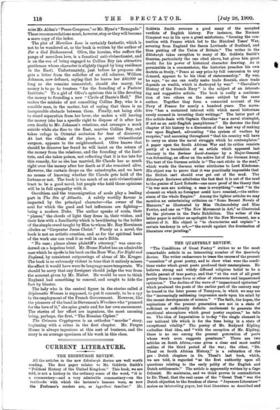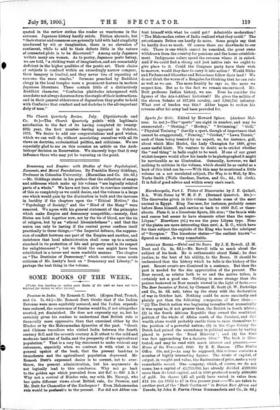THE QUARTERLY REVIEW.
"The Conditions of Great Poetry" strikes us as the most remarkable article in an interesting number of the Quarterly R4 VieW. The writer endeavours to trace the causes of the present "cessation" of great poetry, and to show what were the condi- tions under which great poets produced their masterpieces. He believes strong and widely diffused religious belief to be a fertile parent of true poetry, and that "at the root of all great poetry there is some form or other of strenuous and impassioned optimism." The decline of the wave of "impassioned optimism" which produced the poets of the earlier part of the century may be traced in the later poems of Tennyson, in which we may see the "increasingly saddening impression made upon his mind by the recent developments of science." "The faith, the hopes, the aspirations of the present generation are not in a state of sufficient or sufficiently definite excitement to generate the emotional atmosphere which great poetry requires," he tells us. The idea of Imperialism is to-day "the single element in our national life which is for the time being in a state of exceptional vitality." The poetry of Mr. Rudyard Kipling embodies that idea, and "with the exception of Mr. Kipling, there is no one among the present generation of poets whose work even suggests greatness." There are two articles on South Africa,—one gives a clear and most useful outline of the third period of the war ; the other, "Dr. Theal on South African History," is a refutation of the pro - Dutch chapters in Dr. Theal's last book, which, we are told, is regarded "as the first authority upon all questions relating to the early polity of the English and Dutch settlements." The article is apparently written by a Cape Colonist. He maintains, and we think proves in contradiction to Dr. Theal, that the real cause of the "Great Trek" was the Dutch objection to the freedom of slaves. "Japanese Literature" makes an interesting paper, but that literature as described and
quoted in the review strikes the reader as wearisome in the extreme. Japanese history hardly exists. Fiction abounds, but "their stories and romances are generally told with bald simplicity unadorned by wit or imagination, there is no elevation of sentiment, while to add to their defects little in the nature of connected plots is to be discovered." Among early Japanese writers many are women. As to poetry, Japanese poets betray, we are told, "a striking want of imagination, and are remarkably deficient in the higher qualities of the poetic art. Their choice of subjects is confined within an exceedingly narrow compass, their imagery is limited, and they never tire of repeating ad csaweant the same similes." Sermons preached by Buddhist clergy in the local temples seem a prominent feature in modern Japanese literature. These contain little of a distinctively Buddhist character. "Confucian platitudes interspersed with anecdotes not always decorous form the staple of their instructions, and in their general abhorrence of dogmatism they prefer to hold with Confucius that conduct and not doctrine is the all-important duty of man."



































 Previous page
Previous page